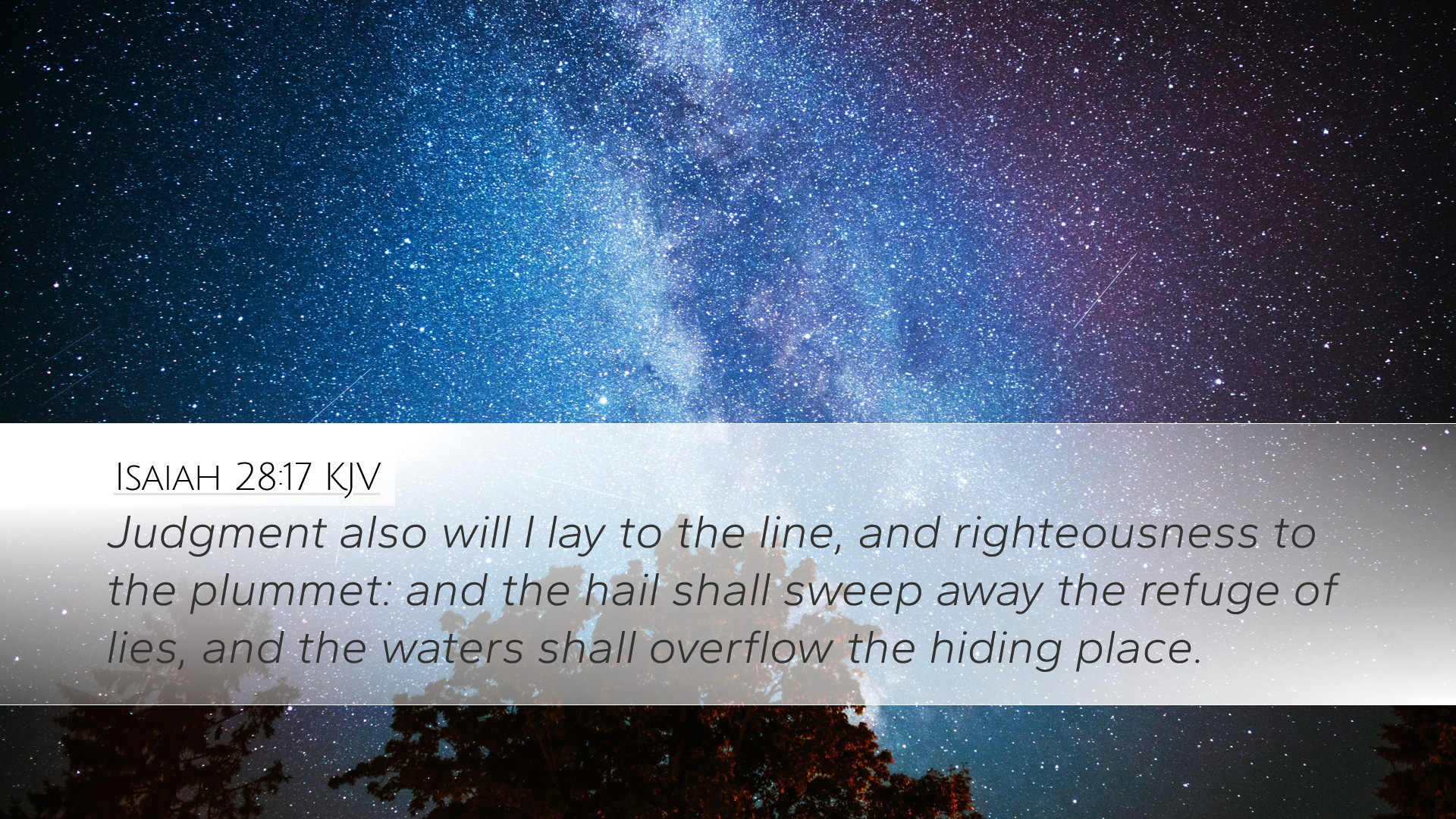Isaiah 28:17 - Commentary
Verse (Isaiah 28:17, ESV): "And I will make justice the line, and righteousness the plumb line; and hail will sweep away the refuge of lies, and waters will overwhelm the shelter."
Introduction
The verse from Isaiah 28:17 serves as a foundational element in understanding divine justice and righteousness in the prophetic literature of the Old Testament. This commentary synthesizes insights from historical public domain commentaries, elucidating the theological and practical implications of the verse.
Interpretation of Key Phrases
- Justice as the Line: The metaphorical use of "line" signifies a standard or measure. Matthew Henry notes that God establishes justice as the metric by which all actions and societal structures are to be judged. The expectation is that of fairness and equity, demanding accountability from leaders and individuals alike.
- Righteousness as the Plumb Line: Righteousness is depicted as the plumb line, maintaining vertical integrity in moral behavior. Albert Barnes interprets this to suggest that righteousness is what forms the basis of appropriate measurements in both individual lives and communal practices.
- Hail Sweeping Away Lies: The imagery of hail reflects sudden and destructive intervention, indicating God's judgment upon deceit and falsehood. Adam Clarke emphasizes that God’s judgment comes as a means to reveal truth, relentlessly eliminating the safety nets created by lies.
- Waters Overwhelming Shelters: This phrase evokes thoughts of overwhelming judgment. Both Henry and Barnes mention that the reference to waters points to chaos and judgment which will expose false refuges built on shaky foundations rather than on the truth of God’s word.
Theological Implications
The theological implications of Isaiah 28:17 are profound. It illustrates God's commitment to justice and righteousness, which are central themes throughout Scripture. Pastors might emphasize that God does not condone injustice or unrighteousness, and that His character demands these elements to be at the forefront of His people’s lives.
This passage serves as a reminder that human constructs of safety and security—often founded on deception—will ultimately fail. The reliance on human wisdom or societal norms without alignment to divine standards leads to inevitable judgment.
Historical Context
Understanding the historical context is crucial in grasping the weight of Isaiah’s message. The Book of Isaiah addresses a time of impending judgment against Israel for their idolatry and injustice. Thus, Isaiah 28 is situated within the theme of warning and divine correction. The leadership of the time was criticized for their corruption and reliance on political alliances rather than on God.
Matthew Henry emphasizes that the original audience would have recognized the urgency in Isaiah’s call for a return to divine principles as a remedy to societal woes.
Practical Applications
- Call to Justice: This verse serves as a clarion call to pastors and leaders within the church to pursue justice fervently as a reflection of God's will. It challenges leaders to evaluate their practices and policies through the lens of God's justice.
- Integrity in Communication: The condemnation of lies prompts a personal reflection. Students and scholars should examine their own lives, ensuring that truth features prominently in their words and actions, as this aligns with God’s standard.
- Encouragement in Trials: Believers facing overwhelming circumstances can find solace in God’s sovereignty as He promises to expose false securities - encouraging a deeper trust in Him alone.
Reflections from Commentators
Albert Barnes provides a sobering reminder that God will not allow falsehood to prevail indefinitely. Adam Clarke’s insights about hail as a swift agent of destruction encourage an understanding that divine intervention may come unexpectedly, urging readiness among the faithful.
Concluding Thoughts
Isaiah 28:17 stands as a monumental declaration of God’s character and His expectations for His people. By merging the insights from classic commentaries, we discern a multi-faceted understanding of justice and righteousness as foundational to any society grounded in divine truth. For pastors, students, and theologians, this verse serves as both a warning and an encouragement to hold fast to God’s standards in a world often swayed by lies.


